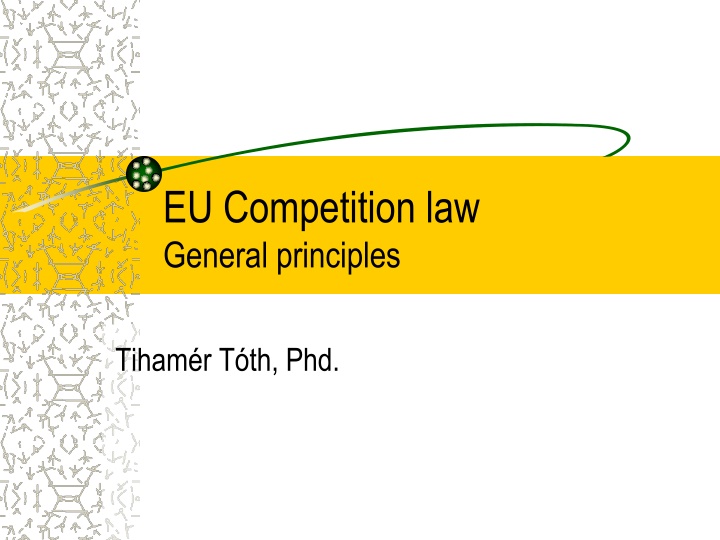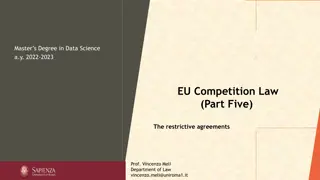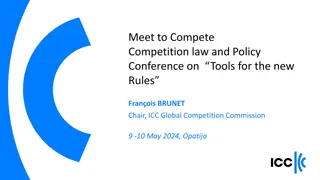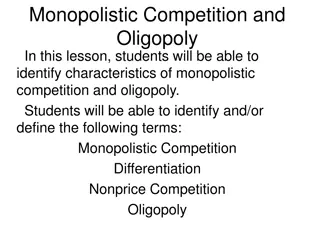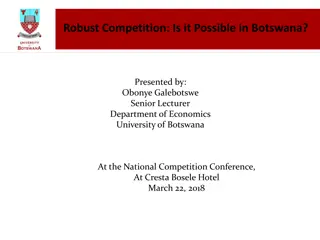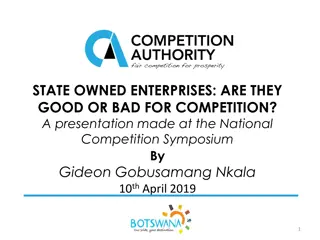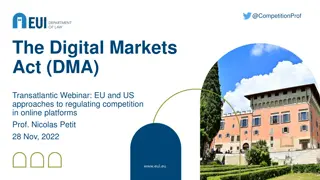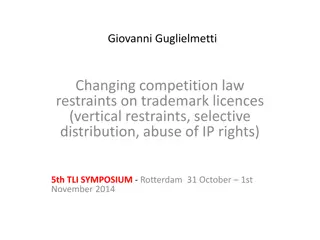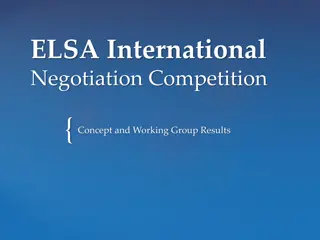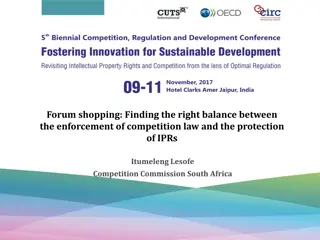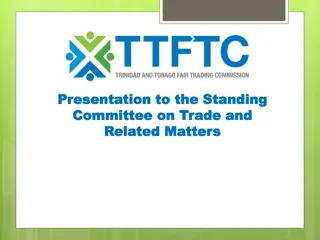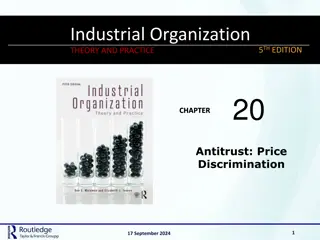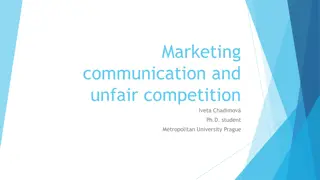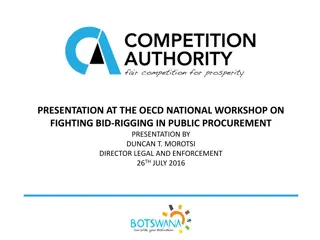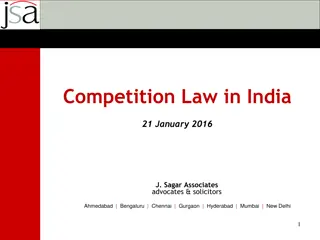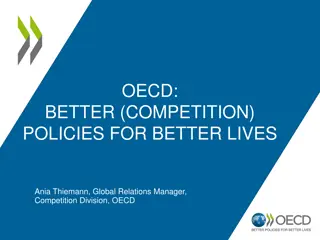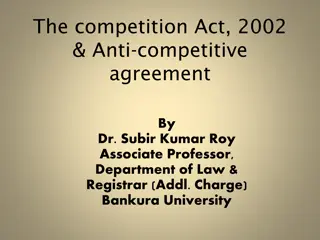EU Competition Law: General Principles and Importance Explained
EU Competition Law covers a wide range of topics such as antitrust, state aid, monopolies, dominance abuse, and more. Understanding this law is crucial for aspiring competition lawyers and those interested in EU legal systems. Competition is a fundamental aspect of economics, promoting innovation, lower prices, and resource allocation. The relationship between competition, culture, and democracy is also explored in depth. While competition has its benefits, it also requires regulation to prevent negative consequences. Dive into the complexities of EU Competition Law and its significance in today's market landscape.
Download Presentation

Please find below an Image/Link to download the presentation.
The content on the website is provided AS IS for your information and personal use only. It may not be sold, licensed, or shared on other websites without obtaining consent from the author.If you encounter any issues during the download, it is possible that the publisher has removed the file from their server.
You are allowed to download the files provided on this website for personal or commercial use, subject to the condition that they are used lawfully. All files are the property of their respective owners.
The content on the website is provided AS IS for your information and personal use only. It may not be sold, licensed, or shared on other websites without obtaining consent from the author.
E N D
Presentation Transcript
EU Competition law General principles Tiham r T th, Phd.
The menue: coverage of EU competition law Rules applicable to MSs Antitrust State aid Anti-competitive agreements State monopolies, exclusive rights Abuse of dominance Anti-competitive state measures M & A
Why is EU competition law important for me? If you want to become a competition lawyer You are a consumer If you are interested in the functioning of EU law Direct applicability/effect Competence sharing between EU/national level Enforcement of EU rules at national level The combination of public and private law Wide use of soft law instruments
What is competition? A situation in which firms independently strive for buyers patronage in order to achieve a particular business objective (profits, sales, market share) - rivalry. A process whereby market actors participate in the economy without overwhelming contraints from private or public power. Is competition (economic freedom) a value in itself, or just an instrument to maximize welfare?
Competition why? The best mechanism for ensuring effective allocation of resources Pressure towards lower prices and more innovation and choice Provides the widest possible freedom of action to all
Competition, culture, and democracy Competition policy is deeply embeded in the way one views human nature and the role of the state Liberal/neoclassical: profit maximizing, rational individualism Socialist theory: man being part of the society, emphasis on social equality, justice Can we have democracy in the absence of free markets and competition?
Is competition good or bad? - CST Just as the unity of human society cannot be founded on an opposition of classes, so also the right ordering of economic life cannot be left to a free competition of forces. ( ) But free competition, while justified and certainly useful provided it is kept within certain limits, clearly cannot direct economic life. ( ) competition can still less perform, since it is a headstrong power and a violent energy that, to benefit people, needs to be strongly curbed and wisely ruled. But it cannot curb and rule itself. Pope Pius XI, Quadragesimo anno, 88.
Competition: good or bad? [T]oday everything comes under the laws of competition and the survival of the fittest, where the powerful feed upon the powerless. As a consequence, masses of people find themselves excluded and marginalized: without work, without possibilities, without any means of escape. Pope Francis
Competition: good or bad? Economy and finance, as instruments, can be used badly when those at the helm are motivated by purely selfish ends. Instruments that are good in themselves can thereby be transformed into harmful ones. But it is man's darkened reason that produces these consequences, not the instrument per se. Therefore it is not the instrument that must be called to account, but individuals, their moral conscience and their personal and social responsibility Pope Benedict, Caritas in Veritate
The (more) economic approach Competition law is part of the law of economics Mainstream economic theories, principles influence legal principles Beware of competition lawyers who ignorant to basic economic rules of the markets! The question nowadays: how much and what kind of economics is needed for correct and effective law enforcement?
Economics - the SCP modell of competition It is just a theory, but Structure of the market Market participants, market shares Barriers to entry Helps identify market power Conduct Pricing, marketing, distribution, R&D Performance Price, output, new products, consumer welfare
Regulating competition Sector specific regulation vs competition law Global competition regulation nationally? State rules Integration level International competition rules? The relations between MS and EU comp. laws SCP: regulating structure or conduct? What about self-regulation?
The aims of EU competition policy To protect the efficient functioning of markets, thereby raising consumer welfare Chicago school To protect the single market open markets Neither State nor private market barriers To protect individual economic freedom of action as a value in itself Considers competition policy as linked to economic and social policy
Sources of Competition law The Treaties Regulations The case law of the Courts Crucial for practicioners: soft law and the decisions of the EU Commission
Institutions shaping EU law Law-making EP and Council of Ministers, Commission Law enforcement EU Commission General Court, ECJ NCA (European Competition Network) courts
Scope: Undertakings Economic activity Irrelevant: Ownership Private/public law foundations Profit seeking Liberal professions included The concept of economic unit
The art of market definition A tool to define boundaries of competition among firms To identify those actual competitors of the undertakings involved that are capable of constraining those undertakings behaviour Two dimensions: relevant product and geographic market Legal relevance: De minimis, BERs, Dominance, Merger control
The scope of EU competition law Subjects of the law Undertakings the notion of economic activity Substantive rules Fines: calculating the maximum Member States Territorial scope (how to cope with globalization) The effect or implementation doctrine Need for international agreements Sectoral scope: general
Sanctions Administrative Private law Prohibition decision Fines up to 10 % of turnover Nullity Action for damages Private enforcement Criminal law, national sanctions?
Anti-competitive agreements The structure of Article 101 TFEU
What is missing? The incompatible with the internal market: all agreements between undertakings, . by associations of and . which may affect trade between Member States and which have as their object . effect the prevention, restriction or distortion of competition within the internal market following shall be prohibited as
Types of business conduct covered under Article 101 Cartels JV, COOPERATION
What are agreements? Meeting of the minds Legally enforcable contract Non-binding gentlemen s agreements, oral agreements Expired agreement which effects continue to be felt Even without an enforcement mechanism Settlement before a court
Concerted practices A form of coordination between undertakings which, without having reached the stage when an agreement properly so-called has been concluded, knowingly substitutes practical cooperation between them for the risks of competition. Any direct or indirect contact between such operators, the object or effect whereof is either to influence the conduct of a competitor or to disclose to such a competitor the course of contact which they themselves have decided to adopt on the market
Concerted practices, cont. Burden of proof is on the Commission/plaintiff Parallel behaviour as such is not illegal can be circumstantial evidence of collusion if there are no other rational explanations Other evidence: meetings, internal notes, wording of letters, closeness of price increases
Unilateral actions As a rule these are not covered by Art. 101 But: actions within a distribution system: seemingly unilateral Refusal to supply discount shops (AEG) Under-supply distributors (VW) Sending of a circular + complying with it (Konica) Real unilateral actions may fall under Art 102
Anti-competitive Is every restriction of conduct restriction of competition? Horizontal and vertical Inter and intra brand competition Actual/potential competition Hard core, black listed restrictions are more or less clear de minimis and BER exceptions
Competition restrictions By object Price cartels Quota cartels Status quo cartels Information exchange on future prices Fixing retail prices for distributors Total prohibition of parallel trade for distributors (absolute territorial protection) By effect Most information exchanges Joint production Joint procurement/selling Standardisation Non-compete in distribution Exclusive distribution Selective distribution
The de minimis notice The power of interpretation Only agreements with an appreciable effect on competition are caught by Article 101 (1) 10% for horizontals, 15 % for verticals Except for hard core restrictions i.e price cartel, market allocation, total ban an exports cumulative market foreclosure effects
May affect trade Actual or potential, direct or indirect effect Wide jurisdictional concept Territories affected: More Member States One Member State Part of one Member State Appreciability (Commission Notice) Negative presumption: 5% and 40 M turnover Likelihood of effect
Article 101 (3) Exception instead of exemption - since 2004 The 4 criteria: Economic development (efficiencies) Fair share to consumers No unnecessary restrictions No elimination of competition VW/Ford JV case
EC block exemption regulations Automatic exemption system, directly applicable Built on the experience of individual exemption cases of the past Safe harbour subject to market shares Blacklisted clauses Explanatory Commission guidelines
EC block exemption regulations Vertical [2790/99 Commission Regulation] Motor vehicle distribution and servicing Technology transfer R&D Specialisation Insurance Vertical and Horizontal Commission Guidelines!
JV agreements Competitors efficiency/welfare enhancing Effect based approach BER, individual exception and de minimis available Industry examples R&D, joint production Joint purchasing agreements What about crisis cartels (Irish beef)?
Article 101 TFEU Cartels
Cartels Competitors by aim infringement - no efficiency justification US: crime EU: most serious infringement Industries affected ( infected ) by cartels Proving cartels Strong investigative powers Leniency policy, settlement procedure State promoted cartels
Is this a cartel? Overproduction of beef in Ireland; Government urged companies to solve the problem Aim: reduce the total capacity of the processing industry by 25% within one year The Beef Industry Developments Society decided to set up a fund financed by market share related contributions to provide compensation to slaughter houses cutting back their capacities; they had to agree not to re- enter the market for 2 years
Is this a cartel? The five mobile phone operators in the Netherlands met and discussed the reduction of standard dealer remunerations for postpaid subscriptions Just one single meeting Sharing confidential information
Hub-and-spoke agreements: retail sector The hub - a firm from a downstream or upstream market, i.e. a retailer - transmits information, mediates, eases tensions, and disciplines cheaters No direct contact between the spokes (i.e. producers) The cartel can be initiated either by the hub or by a spoke Vertical relations used to arrive at a horizontal collusion Awareness of the single anticompetitive purpose or effect (e.g., price fixing, market sharing) 39
Fining policy of the Commission The aim: deterrence and punishment The legal nature of guidelines The maximum: 10%, group, worldwide The significance of affected turnover Aggrevating and mitigating factors Are parents responsible for the wrongdoings of their kids?
Your readingsThe marine hose cartel What is bid-rigging? How did it function, who was the co-ordinator? How did the Commission learn about the cartel? Where did the Commission carry out inspections? What role is given to national judges? How long did the cartel last? How did the Commission calculate the fines? Why was Yokohama Rubber not fined?
Check your knowledge! Your competitor has raised its price by 10% - you simply follow it two days later You sign an agreement to allocate markets with a competitor for 2 years after 2 years you still do not enter each others territory You inform your competitors that next week you will raise prices by 10% - they do not object An association collects information on monthly capacity utilisation from the members and circulates this individualised data among them
Check your knowledge! Public tender to construct an airport Two companies form a consortium, none of whom could perform the job on its own Sharing with your competitors export markets (Russia, USA) for bottled French wine Establish with a competitor a JV to manufacture a new tennis rocket, provided your aggregate market share is below 20%
Article 101 TFEU Distribution agreements
Distribution agreements Vertical/Horizontal restrictions of competition Dominantly effect based approach BER, individual exception and de minimis available Absolute territorial protection is always bad Active/passive sales Exclusive distribution Non-compete Resale price maintenance (RPM)
Is this unlawful? Parker Pen, the manufacturer of prestigious pens with an EU wide market share of 36% sets up an exclusive distribution system with one distributor per each MS. The Czech and Hungarian distributors are 100% owned by Parker Pen, in the Italian distributor it has a 25% stake. To mantain high prices for its German distributors in Germany Parker Pen prohibits its distributors to sell directly or indirectly to German customers.
Check your knowledge! Producer of branded tennis rockets Stipulating in a contract with retailers that the prices listed in an annex shall be applied Sending an e-mail to the retailers not to sell below a certain price to maintain the image, asking them not to reply if they agree Putting into the contract a recommended price but terminating the relationship with those retailers selling below that price Prohibiting its dealer in France to operate an English language website
Check your knowledge! The producer of tennis rockets assigns certain territories to its exclusive dealers where it promises not to appoint other retailers imposes a non-compete obligation on the retailer for 3 years Imposes a post non-compete for 4 months
Abuse of dominance Article 102 TFEU
What is missing? Article 102 TFEU Any by one or more undertakings of a . .position within the internal market or in a substantial part of it shall be prohibited as incompatible with the internal market in so far as it .trade between Member States.
